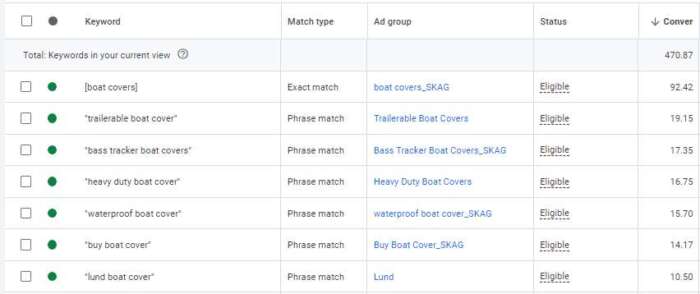Recent Google updates have sent waves through the PPC community, prompting marketers to reassess their approaches and adapt swiftly.
Understanding the Google Updates
Google’s updates, designed to enhance user experience and refine search relevance, have been notably impactful on PPC campaigns. Notable among these are changes to keyword matching options, modifications in ad formats, and algorithm updates affecting ad ranking and visibility.
#1. Keyword Matching Options
Recent adjustments in Google’s keyword matching options have influenced how ads are triggered, impacting campaign performance and budget allocation. Algorithmic tweaks to ad ranking mechanisms introduced subtle shifts in ad position and visibility within search results. Advertisers observed fluctuations in ad performance metrics, prompting adjustments in bidding strategies and ad quality optimizations to maintain competitive positions.
These updates leverage advancements in machine learning and natural language processing to better understand user intent and context which makes ads show up more accurately and work better.
With Google increasingly emphasizing user intent, broad match modifiers and phrase match expansions have become more nuanced, requiring advertisers to fine-tune their keyword strategies to align with user intent, maximize campaign performance, and adapt to evolving search behaviors and algorithmic changes.

Source: SealSkinCovers
#2. Ad Format Modifications
Google’s continuous drive for innovation has resulted in updates to ad formats, including expanded text ads and responsive search ads. While providing more flexibility and ad space, these updates require strategic adjustments to boost engagement and click-through rates effectively.
Ad format modifications introduced by Google aim to improve the effectiveness, relevance, and user experience of PPC ads. Advertisers must adapt their messaging and creative elements to align with these evolving formats to ensure compelling user experiences across devices.

Source: SealSkinCovers
#3. Algorithm Updates
Google’s algorithm updates, including core updates and quality score recalibrations, have profound implications for PPC campaigns. Recalibrations of quality score algorithms could result in changes to how Google evaluates and assigns quality scores to ads and keywords. Advertisers may experience fluctuations in their quality scores and CPCs as a result.
Changes in ad ranking factors and auction dynamics can significantly impact ad visibility and cost-per-click (CPC), requiring vigilant monitoring and agile optimization strategies to maintain campaign efficacy and competitiveness. Advertisers may also need to adapt their bidding strategies and optimization tactics to remain competitive in the auction environment.
Algorithm updates may also introduce new ad formats, features, or targeting options to Google Ads, providing advertisers with additional opportunities to reach and engage their target audience. Advertisers should stay informed about these updates and explore how they can leverage new ad formats and features to enhance the performance and effectiveness of their PPC campaigns.
Assessing the Impact
Advertisers should evaluate the performance of individual keywords, ad groups, and ad creatives to determine whether there have been any changes in effectiveness or relevance following Google updates. Assessing metrics such as click-through rates, conversion rates, and quality scores for specific keywords and ads can provide insights into how Google updates have impacted their performance and visibility in search results.
By comparing performance metrics before and after the implementation of Google updates, advertisers can identify any significant changes or trends that may indicate the impact of the updates on their PPC campaigns.
Advertisers should review their budget allocation strategies and spending patterns to assess whether there have been any shifts or adjustments in response to the updates and whether these changes align with their campaign objectives and performance goals.
Advertisers can gather feedback from users, such as customer inquiries, comments, and reviews, to assess how recent Google updates have influenced their interactions with PPC ads. Metrics like ad engagement rate and bounce rate can be very helpful for finding out about the impact of Google updates on user behavior and preferences.
Based on the findings of their impact assessment, advertisers should develop optimization strategies to address any challenges or opportunities identified as a result of recent Google updates. This may involve adjusting bidding strategies, refining keyword targeting, optimizing ad creatives, or experimenting with new ad formats and features to improve campaign performance and effectiveness.

Source: BigPanda
Insights from Industry Leaders
Industry leaders weighed in on the implications of March 2024 Google updates on PPC campaigns. According to most of them, the updates underscore the importance of agility and optimization in PPC campaigns, so advertisers must embrace data-driven strategies and proactive experimentation to stay ahead in the ever-changing digital advertising ecosystem.
Final Thoughts
As Google improves its search algorithms and ad platforms, it continues to have a big and varied impact on PPC campaigns. Advertisers must continuously reassess their strategies and tactics to leverage new opportunities and mitigate challenges. In the pursuit of advertising excellence, adaptation is not merely a choice but a necessity.



